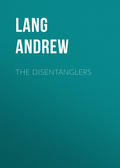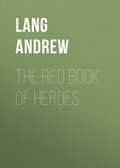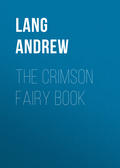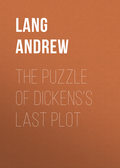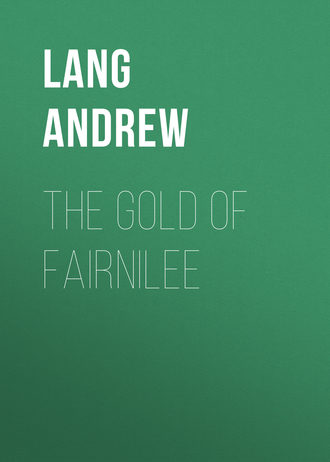
Lang Andrew
The Gold Of Fairnilee
CHAPTER X. —Out of fairyland
YOU may fancy, if you can, what joy there was in Fairnilee when Randal came home. They quite forgot the hunger and the hard times, and the old nurse laughed and cried over her bairn that had grown into a tall, strong young man. And to Lady Ker it was all one as if her husband had come again, as he was when first she knew him long ago; for Randal had his face, and his eyes, and the very sound of his voice. They could hardly believe he was not a spirit, and they clasped his hands, and hung on his neck, and could not keep their eyes off him. This was the end of all their sorrow, and it was as if Randal had come back from the dead; so that no people in the world were ever so happy as they were next day, when the sun shone down on the Tweed and the green trees that rustle in the wind round Fairnilee. But in the evening, when the old nurse was out of the way, Randal sat between his mother and Jean, and they each held his hands, as if they could not let him go, for fear he should vanish away from them again. And they would turn round anxiously if anything stirred, for fear it should be the two white deer that sometimes were said to come for people escaped from Fairyland, and then these people must rise and follow them, and never return any more. But the white deer never came for Randal.
So he told them all his adventures, and all that had happened to him since that midsummer night, seven long years ago.
It had been with him as it was with Jean He had gone to the Wishing Well, and wished to see the Fairy Queen and Fairyland. And he had seen the beautiful castle in the well, and a beautiful woman’s face had floated up to meet his on the water. Then he had gathered the white roses, and then he heard a great sound of horses’ feet, and of bells jingling, and a lady rode up, the very lady he had seen in the well. She had a white horse, and she was dressed in green, and she beckoned to Randal to mount on her horse, with her before him on the pillion. And the bells on the bridle rang, and the horse flew faster than the wind.
So they rode and rode through the summer night, and they came to a desert place, and living lands were left far behind. Then the Fairy Queen showed him three paths, one steep and narrow, and beset with briars and thorns: that was the road to goodness and happiness, but it was little trodden or marked with the feet of people that had come and gone.
And there was a wide smooth road that went through fields of lilies, and that was the path of easy living and pleasure.
The third path wound about the wild hillside, through ferns and heather, and that was the way to Elfland, and that way they rode. And still they rode through a country of dark night, and they crossed great black rivers, and they saw neither sun nor moon, but they heard the roaring of the sea. From that country they came into the light, and into the beautiful garden that lies round the castle of the Fairy Queen. There they lived in a noble company of gallant knights and fair ladies. All seemed very mirthful, and they rode, and hunted, and danced; and it was never dark night, nor broad daylight, but like early summer dawn before the sun has risen.
There Randal said that he had quite forgotten his mother and Jean, and the world where he was born, and Fairnilee.
But one day he happened to see a beautiful golden bottle of a strange shape, all set with diamonds, and he opened it. There was in it a sweet-smelling water, as clear as crystal, and he poured it into his hand, and passed his hand over his eyes. Now this water had the power to destroy the “glamour” in Fairyland, and make people see it as it really was. And when Randal touched his eyes with it, lo, everything was changed in a moment. He saw that nothing was what it had seemed. The gold vanished from the embroidered curtains, the light grew dim and wretched like a misty winter day.
The Fairy Queen, that had seemed so happy and beautiful in her bright dress, was a weary, pale woman in black, with a melancholy face and melancholy eyes. She looked as if she had been there for thousands of years, always longing for the sunlight and the earth, and the wind and rain. There were sleepy poppies twisted in her hair, instead of a golden crown. And the knights and ladies were changed. They looked but half alive; and some, in place of their gay green robes, were dressed in rusty mail, pierced with spears and stained with blood. And some were in burial robes of white, and some in dresses torn or dripping with water, or marked with the burning of fire. All were dressed strangely in some ancient fashion; their weapons were old-fashioned, too, unlike any that Randal had ever seen on earth. And their festivals were not of dainty meats, but of cold, tasteless flesh, and of beans, and pulse, and such things as the old heathens, before the coming of the Gospel, used to offer to the dead. It was dreadful to see them at such feasts, and dancing, and riding, and pretending to be merry with hollow faces and unhappy eyes.
And Randal wearied of Fairyland, which now that he saw it clearly looked like a great unending stretch of sand and barren grassy country, beside a grey sea where there was no tide. All the woods were of black cypress trees and poplar, and a wind from the sea drove a sea-mist through them, white and cold, and it blew through the open courts of the fairy castle.
So Randal longed more and more for the old earth he had left, and the changes of summer and autumn? and the streams of Tweed, and the hills, and his friends. Then the voice of Jeanie had come down to him, sounding from far away. And he was sent up by the Fairy Queen in a fairy form, as a hideous dwarf, to frighten her away from the white roses in the enchanted forest.
But her goodness and her courage had saved him, for he was a christened knight, and not a man of the fairy world. And he had taken his own form again beneath her hand, when she signed him with the Cross, and here he was, safe and happy, at home at Fairnilee.
CHAPTER XI. —The Fairy Bottle
WE soon grow used to the greatest changes, and almost forget the things that we were accustomed to before. In a day or two, Randal had nearly forgotten what a dull life he had lived in Fairyland, after he had touched his eyes with the strange water in the fairy bottle. He remembered the long, grey sands, and the cold mist, and the white faces of the strange people, and the gloomy queen, no more than you remember the dream you dreamed a week ago. But he did notice that Fairnilee was not the happy place it had been before he went away. Here, too, the faces were pinched and white, and the people looked hungry. And he missed many things that he remembered: the silver cups, and plates, and tankards. And the dinners were not like what they had been, but only a little thin soup, and some oatmeal cakes, and trout taken from the Tweed. The beef and ale of old times were not to be found, even in the houses of the richer people.
Very soon Randal heard all about the famine; you may be sure the old nurse was ready to tell him all the saddest stories.
“Full many a place in evil case Where joy was wont afore, oh! Wi’ Humes that dwell in Leader braes, And Scotts that dwell in Yarrow!”
And the old woman would croon her old prophecies, and tell them how Thomas the Rhymer, that lived in Ercildoune, had foretold all this. And she would wish they could find these hidden treasures that the rhymes were full of, and that maybe were lying – who knew? – quite near them on their own lands.
“Where is the Gold of Fairnilee?” she would cry; “and, oh, Randal! can you no dig for it, and find it, and buy corn out of England for the poor folk that are dying at your doors?
‘Atween the wet ground and the dry
The Gold o’ Fairnilee doth lie.’
There it is, with the sun never glinting on it; there it may bide till the Judgment-day, and no man the better for it.
‘Between the Camp o’ Rink
And Tweed water clear,
Lie nine kings’ ransoms
For nine hundred year.’”
“I doubt it’s fairy gold, nurse,” said Randal, “and would all turn black when it saw the sun. It would just be like this bottle, the only thing I brought with me out of Fairyland.”
Then Randal put his hand in his velvet pouch, and brought out a curious small bottle.7 It was shaped like this, and was made of something that none of them had ever seen before. It was black, and you could see the light through it, and there were green and yellow spots and streaks on it.
“That ugly bottle looked like gold and diamonds when I found it in Fairyland,” said Randal, “and the water in it smelled as sweet as roses. But when I touched my eyes with it, a drop that ran into my mouth was as salt as the sea, and immediately everything changed: the gold bottle became this glass thing, and the fairies became like folk dead, and the sky grew grey, and all turned waste and ugly. That’s the way with fairy gold, nurse; and if you found it, even, it would all be dry leaves and black bits of coal before the sun set.”
“Maybe so, and maybe no,” said the old nurse. “The Gold o’ Fairnilee may no be fairy gold, but just wealth o’ this world that folk buried here lang syne. But noo, Randal, ma bairn, I maun gang out and see ma sister’s son’s dochter, that’s lying sair sick o’ the kincough8 at Rink, and take her some of the physic that I gae you and Jean when you were bairns.”
So the old nurse went out, and Randal and Jean began to be sorry for the child she was going to visit. For they remembered the taste of the physic that the old nurse made by boiling the bark of elder-tree branches; and I remember it too, for it was the very nastiest thing that ever was tasted, and did nobody any good after all.
Then Randal and Jean walked out, strolling along without much noticing where they went, and talking about the pleasant days when they were children.




